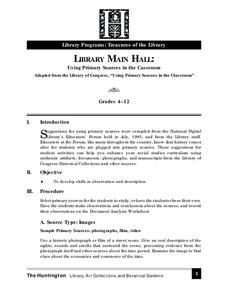Scientific American
Life-Sized Drawing
Ocean explorers or mathematicians research the wreck of the CSS H.L. Hunley. They investigate the actual dimensions of the Hunley using math and measuring skills. Afterward, they sketch a large scale drawing of the submarine outdoors on...
National Wildlife Federation
Quantifying Land Changes Over Time Using Landsat
"Humans have become a geologic agent comparable to erosion and [volcanic] eruptions ..." Paul J. Crutzen, a Nobel Prize-winning atmospheric chemist. Using Landsat imagery, scholars create a grid showing land use type, such as urban,...
Curated OER
Using Primary Sources in the Classroom
Scholars study a historical photograph to make predictions of what happened right after the picture was taken. They research a variety of different topics and use primary sources to answer questions about common food, fashion trends, and...
Curated OER
Wreck Detectives
Students investigate shipwrecks. In this marine archaeology instructional activity ,students collect data and make inferences about the causes of shipwrecks. Students work in groups to create their own model of a shipwreck using clay....
Curated OER
Portrait and Figure Drawing
Students investigate the self-portraits and figure drawings of famous artists such as Käthe Kollowitz, Pablo Picasso, Rembrandt and others following their own attempts to create their expressive original drawings.
Curated OER
Grid it, Map it
Learners participate in designing a city layout using grids and coordinates. They work on a city space and create a grid on a life size layout on the gym floor.
Curated OER
Shipwreck Mystery
Young scholars draw inferences about a shipwreck. In this marine archaeologist activity, students examine historical and archaeological data to draw inferences about the age and identity of shipwrecks.
Curated OER
Squares and Square Roots
Students find patterns relating the lengths of the sides of squares to their areas. In this squares and square roots lesson, students draw squares and find their areas. They estimate the sides of square when given the area. Students use...
Curated OER
Trips of Culture: The Statue of Liberty
Students take a pre-trip quiz about the Statue of Liberty and take a photo tour on the Internet. They then produce a grid drawing of an object and use a known measurement to estimate unknown measurements.
Curated OER
Do You Have a Sinking Feeling
Students determine how marine archaeologists use historical and archaeological data to draw inferences about shipwrecks. Students plot the position of a shipwrecked vessel, and draw inferences about the shipwreck from artifacts that have...
Curated OER
Marine Archaeology
Students examine marine archaeology. In this archaeological data lesson, students see how archaeologists use data to make inferences about shipwrecks. Students read data and make their own inferences, write about marine life and...
Curated OER
Less is More: Realizing Mathematics Through Agriculture
High schoolers study the architectural designs of different popular sites. In this math lesson, students draw a grid diagram. They explain what geodesic algorithms are used for.
Curated OER
Fraction and Decimal Garden
Third graders write fractions and decimals using unifix cube models and grid paper. They draw a garden using grid paper and label each section with the correct fraction and decimal to the tenths. This is a clever way to use manipulatives...
Curated OER
Perimeter Playground
Young scholars explore geometry by participating in a school measuring activity. In this perimeter lesson, students discuss the techniques and methods used in order to measure a large perimeter or geometric figure. Young scholars utilize...
Curated OER
Surrealism
Seventh graders research several surrealist artists, e.g. Dali, Magritte, etc., and analyze and compare their styles. They apply their knowledge to their own drawings in pastel of flowers and plants.
Curated OER
Stampin' Ground
Young scholars anticipate the results of using stamps to create patterns and visual effects through repetition. They enhance their understanding of positive and negative space. Also, investigation is done on fabrics and products made in...
Curated OER
How Worldly Are You?
Sixth graders locate and map six components to have a working knowledge of maps. In this map skills lesson, 6th graders define the six map components and work in groups to draw a map using the components. Students read a related...
Curated OER
Checkerboard
Students explore the game of checkers and the folk art that has been used to create checkerboards. They create their own checkerboards that reflect current culture.
Curated OER
Schedule Changing Prepositions
Students discuss the appropriate and inappropriate reasons for requesting a schedule change at work. They create scripts for requesting a change that uses appropriate prepositions and prepositional phrases. Students practice using...
Curated OER
Tiling the Plane
Students use pattern blocks and triangular grid paper to review shape names, be introduced to the concept of a tiling of the plane, and determine which pattern blocks tile the plane. They are asked: "Have you ever seen a floor or a wall...
Curated OER
Face It!
Students explore the proportions of the human face and utilize a graph to draw a self portrait based upon the techniques and styles of a variety of artists.
Curated OER
Vehicles
High schoolers develop appropriate vocabulary for identifying types of vehicles. After viewing pictures of automobiles, students work to create a brief, accurate description of the vehicle using proper vocabulary and grammar. High...
Curated OER
Heroes Portrait
Eighth graders investigate art appreciation and Renaissance portraits through time. They create a portrait.
Curated OER
Story Framing Legends
Students review, examine and study the seven stages to a traditional legend or modern story in legend form. They locate two traditional legend stories and see if they fit into the two categories listed for them in two boxes. Each student...























